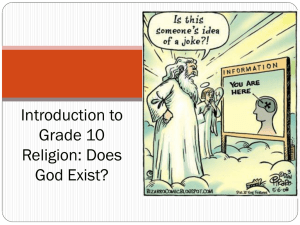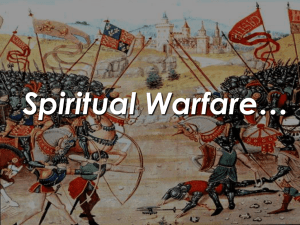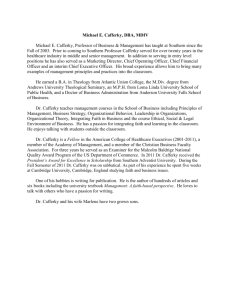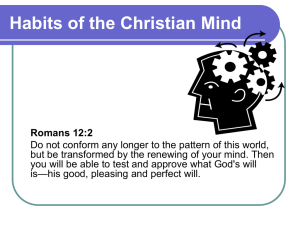Easter 6
advertisement
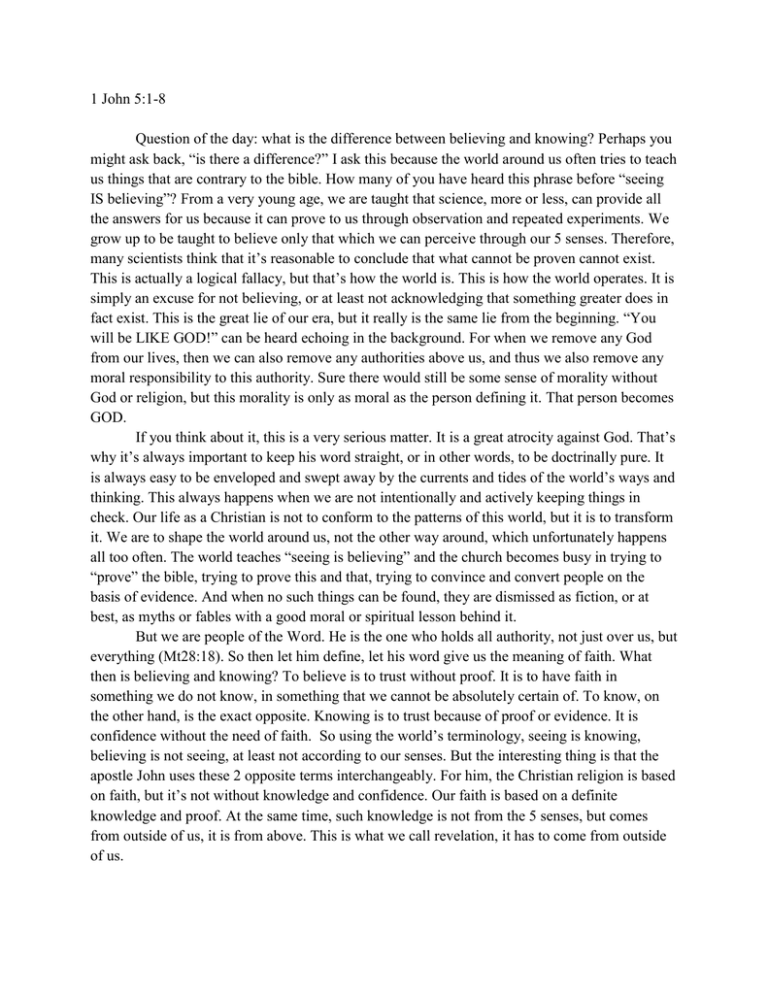
1 John 5:1-8 Question of the day: what is the difference between believing and knowing? Perhaps you might ask back, “is there a difference?” I ask this because the world around us often tries to teach us things that are contrary to the bible. How many of you have heard this phrase before “seeing IS believing”? From a very young age, we are taught that science, more or less, can provide all the answers for us because it can prove to us through observation and repeated experiments. We grow up to be taught to believe only that which we can perceive through our 5 senses. Therefore, many scientists think that it’s reasonable to conclude that what cannot be proven cannot exist. This is actually a logical fallacy, but that’s how the world is. This is how the world operates. It is simply an excuse for not believing, or at least not acknowledging that something greater does in fact exist. This is the great lie of our era, but it really is the same lie from the beginning. “You will be LIKE GOD!” can be heard echoing in the background. For when we remove any God from our lives, then we can also remove any authorities above us, and thus we also remove any moral responsibility to this authority. Sure there would still be some sense of morality without God or religion, but this morality is only as moral as the person defining it. That person becomes GOD. If you think about it, this is a very serious matter. It is a great atrocity against God. That’s why it’s always important to keep his word straight, or in other words, to be doctrinally pure. It is always easy to be enveloped and swept away by the currents and tides of the world’s ways and thinking. This always happens when we are not intentionally and actively keeping things in check. Our life as a Christian is not to conform to the patterns of this world, but it is to transform it. We are to shape the world around us, not the other way around, which unfortunately happens all too often. The world teaches “seeing is believing” and the church becomes busy in trying to “prove” the bible, trying to prove this and that, trying to convince and convert people on the basis of evidence. And when no such things can be found, they are dismissed as fiction, or at best, as myths or fables with a good moral or spiritual lesson behind it. But we are people of the Word. He is the one who holds all authority, not just over us, but everything (Mt28:18). So then let him define, let his word give us the meaning of faith. What then is believing and knowing? To believe is to trust without proof. It is to have faith in something we do not know, in something that we cannot be absolutely certain of. To know, on the other hand, is the exact opposite. Knowing is to trust because of proof or evidence. It is confidence without the need of faith. So using the world’s terminology, seeing is knowing, believing is not seeing, at least not according to our senses. But the interesting thing is that the apostle John uses these 2 opposite terms interchangeably. For him, the Christian religion is based on faith, but it’s not without knowledge and confidence. Our faith is based on a definite knowledge and proof. At the same time, such knowledge is not from the 5 senses, but comes from outside of us, it is from above. This is what we call revelation, it has to come from outside of us. Indeed what we believe we do not have proof. We have no proof that Jesus rose from the dead, we have no proof that his death on the cross actually forgives sins, and going to the source of all these teachings, the bible, we also have no proof that this is actually the word of God. There is no proof for any of the things we teach, we simply believe them to be what they are. Such faith does not cause doubt or uncertainty because the faith that we have is from God himself. And because faith is from God, we can have confidence of in this faith. Therefore we DON’T say, “I’m forgiven, someday. I will go to heaven, perhaps. God totally loves me, maybe.” This is the confidence that John is describing, which is in all of us. Unfortunately there are some who object to this. They will say that it’s wrong to be so sure of one’s standing before God. In fact, they teach that it is a vice for such boasting. They may look at us and say, “how can you be so arrogant and say for sure that you will go to heaven? How can you be so confident that your sins are forgiven?” In such situations, then you can join St Paul who says, “Let the one who boasts, boast in the Lord.” When we can be sure of heaven and eternal life, not because we are boasting in our own righteousness and good deeds, but because we believe and know that the one from on high came down to win and to give the victory for us. He is the one who has overcome the world. It is in him we boast. How can we be certain? Well, John tells us of the witnesses that testify to this. It is a strange statement from John indeed, but if we believe in all the promises and teachings in the bible, then there is no reason for not believing in this as well. We often describe God as almighty, meaning that he is all powerful, all knowing, present everywhere, in summary, it means he has no bounds. And yet he has bound himself. He binds himself first and foremost to his own words. He has made a promise and now he can’t change his mind. He has promised that for the sake of his son, because he has sacrificed himself on the cross, he counts all of the rest of mankind as justified, not guilty, forgiven. The son too has bound himself, though being God, he did not count equality with God (Phi 2:6ff), but made himself nothing to become a servant of us all. He has bound himself not only to the words of his Father, but he has taken on the flesh, so that John here writes that he came by water and blood. I am sure most of you who have been in the Lutheran church long enough will immediately translate this water and blood as the sacraments of baptism and holy supper. If this is the case, then your pastors before me have done their jobs quite well. But here, John is not referring to the sacraments. He is referring to the testimonies and witnesses of these things that the spirit bear on account of the person of Jesus Christ. It means that the spirit uses these things to show that Jesus is the one who would overcome the world. He did that at Jesus’ baptism. There water was used and bore witness along with the spirit and the father’s voice. Then again, at the cross, his blood was poured out as a ransom for many. Interestingly too, that only in John’s gospel does he describe the piercing of the side, which then gushed out water and blood. This is the ultimate witness, for this is the purpose for the son of God to bind himself into the flesh. This is the reason why God binds himself to his word. It is so that Jesus should die for the sins of the whole world. And this testimony is not so far away from us as if we are left with just the word, though the word alone should suffice. The word of promises in the gospel should be enough to give us faith, to bring confidence and assurance in our hearts. But the God of all mercies and grace has bound himself in these earthly things, the water and the blood, so that today we may actually see and touch and smell and taste. In these gifts, the spirit has bound himself to us. As often as water is used in holy baptism, the spirit is bound to be found and he is also bound to reside in the one who is baptized. As often as the holy supper is celebrated, as often as the bread and wine is orally eaten, as often as the promises are attached to these earthly means, the spirit then again binds himself to these, and then also to us. What is believing and what is knowing? We can define these and many other theological terms in an objective way. This means this or that. But the word of God is not left with a bunch definitions and meanings, which doesn’t really relate to our lives. It is a bit unfortunate that the great Lutheran question in the small catechism is translated as “what does this mean?”. The original German is “was ist das?”. It is a simple question of a child – “what is this?” Your child points to a cookie and ask “what is this?” and you don’t simply give a definition, but you may also say, “this is a cookie, it is sweet, it tastes good.” So also when we talk about faith and all these other things. What is believing and knowing? It is to trust with absolute certainty, confidence, and assurance that we extend our hands to receive it. Just like the little child enquiring about the cookie, hears of its goodness, trusting the parent’s word, will readily grab it, not just one, but the entire jar. So also, faith is not simply knowledge, but it’s a hand that extends to receive. It receives these testimonies, the water and the blood, for the forgiveness of sins, eternal life, and heaven itself. Then in turn, faith is strengthened even more as these are in themselves witnesses for the purpose of increasing faith. Indeed, doubt and disbelief is always lurking in the shadows. It’s not that there is something wrong with our faith because as I said earlier, faith is a gift from God so that you may trust with full confidence. We doubt because of our the old natures in us. That’s why God binds himself in all these things so that he may remove any doubts and uncertainty and sin from our hearts. And so today, once again, our lord binds himself. He binds himself so that he may come to us. He binds himself so that we may approach him with love and confidence. This does this only so that we may with full confidence, trust in him, that our sins are forgiven, that we have eternal life, that heaven is our home.



